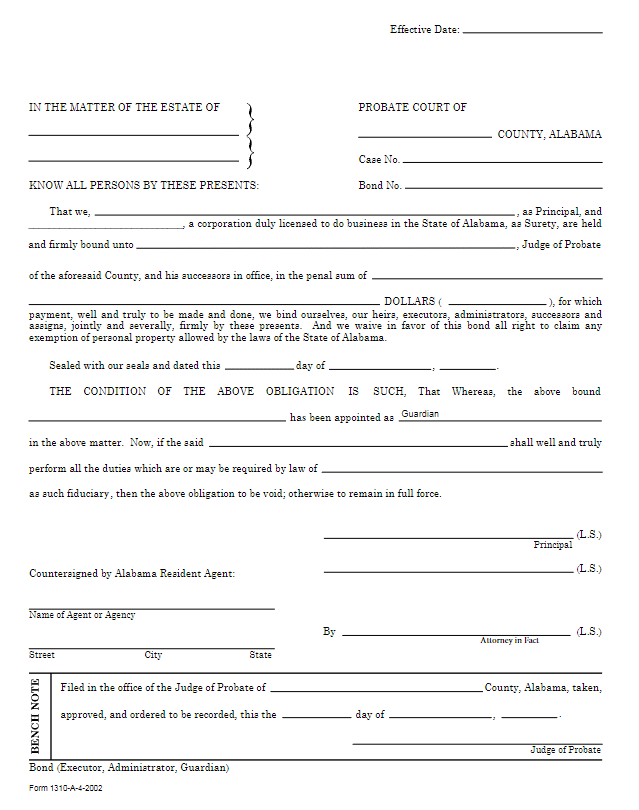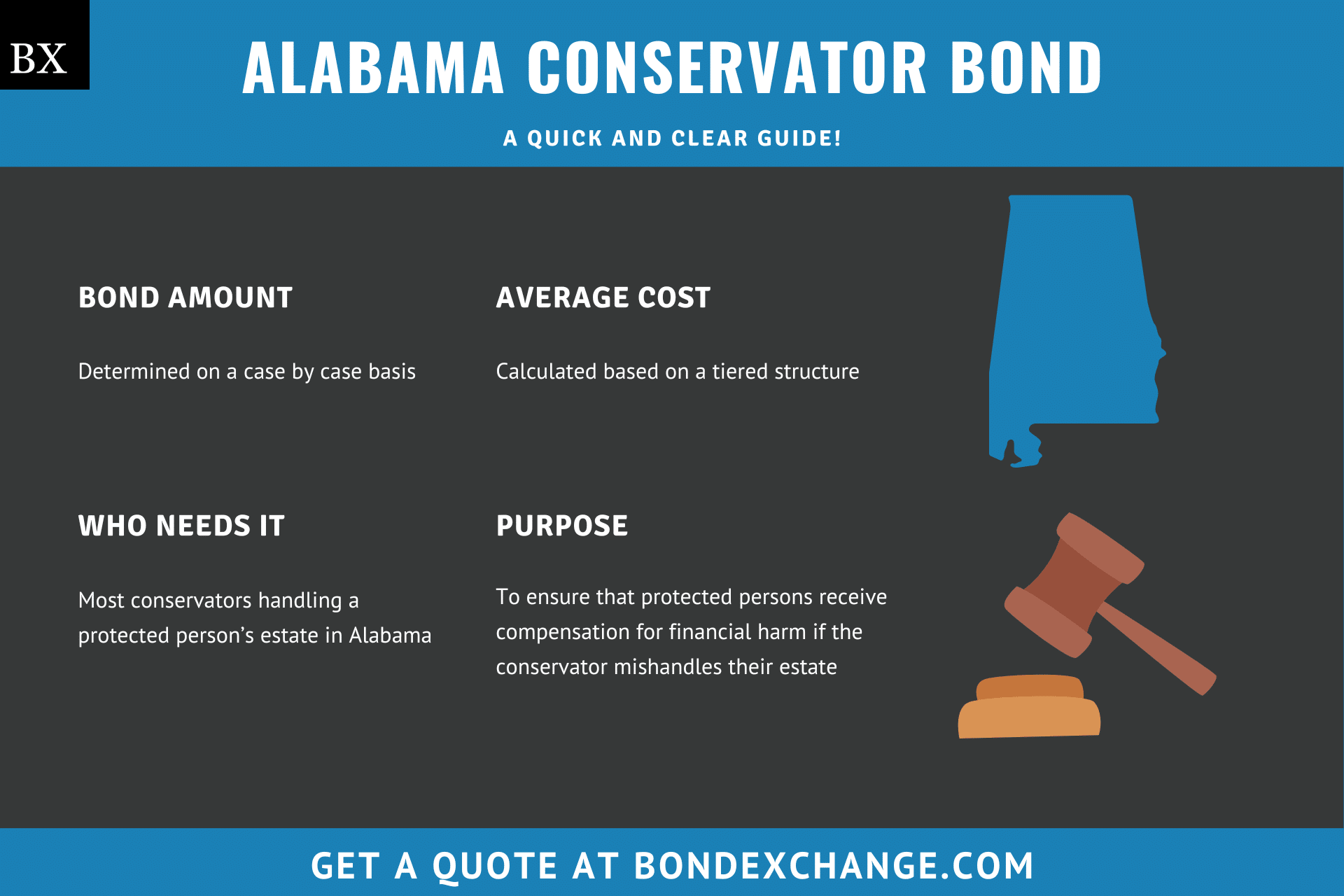Alabama Conservator Bond: A Comprehensive Guide
This guide provides information for insurance agents to help their customers obtain an Alabama Conservator bond.
At a Glance:
- Average Cost: Calculated based on a tiered structure
- Bond Amount: Determined on a case-by-case basis (more on this later)
- Who Needs It: Most conservators handling a protected person’s estate in Alabama
- Purpose: To ensure that protected persons receive compensation for financial harm if the conservator mishandles their estate
- Who Regulates Conservator Bonds in Alabama: The probate court of the county where the protected person resides or has property

Background
Alabama Code 26-2A-130 requires all persons seeking conservatorship over a protected person to be appointed by the probate court of the county where the protected person resides before assuming their fiduciary duties. The Alabama legislature enacted the appointment requirement to ensure that conservators act in the protected person’s best interests.
To provide financial security for the enforcement of this requirement, conservators that have decision-making power over a protected person’s estate may purchase and maintain a probate surety bond before becoming appointed as a fiduciary.
What is the Purpose of the Alabama Conservator Bond?
Alabama requires conservators to purchase a surety bond as a prerequisite to being appointed as a fiduciary over a protected person’s estate. The bond ensures that protected persons will receive compensation for financial harm if the conservator fails to abide by the regulations outlined in Alabama Code 26-2A-139. Specifically, the bond protects the protected person if the conservator fails to adhere to all court orders or mismanages the estate’s assets. In short, the bond is a type of insurance that protects the protected person if the conservator does not fulfill their fiduciary duties.
How Can an Insurance Agent Obtain an Alabama Conservator Bond?
BondExchange makes obtaining an Alabama Conservator bond easy. Simply log-in to your account and use our keyword search to find the “Conservator” bond in our database. Don’t have a login? Gain access now and let us help you satisfy your customers’ needs. Our friendly underwriting staff is available by phone (800) 438-1162, email or chat from 7:30 AM to 7:00 PM EST to assist you.
At BondExchange, our 40 years of experience, leading technology, and access to markets ensures that we have the knowledge and resources to provide your clients with fast and friendly service whether obtaining quotes or issuing bonds.
Not an agent? Then let us pair you with one!

Click the above image to find a BX Agent near you
How is the Bond Amount Determined?
Alabama Code 26-2A-139 dictates that the bond amount must be equal to the aggregate value of the estate’s property under the conservator’s control plus the estimated income to be generated by the estate over the next year. The bond amount may be reduced by the value of any securities deposited that cannot be withdrawn without a court order or any land that the conservator can not sell without authorization from the court.
Fiduciaries that do not wish to purchase a bond may request to submit a pledge of securities, other assets, or a mortgage of land.
Can the Bond Amount be Adjusted?
Yes, as Alabama Code 26-2A-139 permits the court to increase and reduce the required bond amount as they see fit. Also, anyone interested in the welfare or estate of the protected person may file a petition to the probate court to request an increase or reduction of the bond amount.
What are the Underwriting Requirements for the Alabama Conservator Bond?
Most surety companies will examine the following factors when determining eligibility for the Alabama Conservator bond:
- Conservator’s credit history
- Whether or not the estate has an attorney
- Whether or not the conservator is a family member
- The conservator’s occupation
- Whether or not the conservator is replacing a prior fiduciary
- If the conservator has ever committed a felony
- Whether or not there is any ongoing business in the estate
- If the bond is being required by a creditor
- If the bond amount is greater than or equal to the estate’s value
How Much Does the Alabama Conservator Bond Cost?
Surety companies typically determine the premium rate for conservator bonds based on a tiered structure. As a result, larger bond amounts will be charged a lower premium rate than smaller bonds.
The following table illustrates the pricing structure for the Alabama Conservator bond:
$1,500,000 Conservator Bond Cost
| Bond Amount | Premium Rate | Total Bond Cost |
|---|---|---|
| First $20,000 | 0.75% | $150 |
| Next $40,000 | 0.60% | $240 |
| Next $140,000 | 0.50% | $700 |
| Next $300,000 | 0.375% | $1,125 |
| Next $1,000,000 | 0.25% | $2,500 |
| Total cost of $4,715 |
Who is Required to Purchase the Bond?
Alabama requires conservators with decision-making authority over a protected person’s estate to purchase a surety bond as a prerequisite to becoming a court-appointed fiduciary. To paraphrase Alabama Code 26-2A-20, a conservator is a person who is appointed by a court to manage the estate and business affairs of a protected person. Additionally, a “protected person” is defined as either a minor or other person for whom a conservator has been appointed that is incapable of making sound decisions concerning their estate and/or business affairs.
Conservators are not required to purchase a bond if the requirement was waived by a person with the power to nominate a conservator in a will or other similar writing. However, conservators that are exempt from purchasing a bond must still do so in the following situations:
- If any person with an interest in the protected person or their estate petitions the court to require one
- If the court determines that a bond is necessary

How do Alabama Conservators Become Appointed as Fiduciaries?
Conservators in Alabama must navigate several steps to become appointed as fiduciaries. Below are the general guidelines, but appointees should refer to the appointment statutes for details on the process.
Step 1 – Determine Priority
Priority to serve as a conservator is granted in the following order:
-
- Persons already appointed as a fiduciary over the protected person in another jurisdiction
- An individual or corporation nominated by the protected person if they are at least 14 years old
- An attorney-in-fact under a valid power of attorney executed by the protected person
- The spouse of the protected person or their nominee by will if they are deceased spouse
- An adult child of the protected person
- A parent or their nominee by the will if they are deceased
- Any relative of the protected person who has resided with the person for at least six months before the filing of the petition
- A nominee by one who is caring for or paying benefits to the protected person
- A general guardian or sheriff of the county
Step 2 – Hire an Attorney
Although not explicitly required, it is highly recommended that conservators hire an attorney to assist with the conservatorship process.
Step 3 – File a Petition
Persons seeking conservatorship over a minor or incapacitated adult must file a petition for appointment with the probate court of the county where the person to be protected resides. Conservators can obtain the petition from the probate court and must ensure to include the following information:
-
- Personal information of the person to be protected
- General statement and evaluation of the person’s property
- The reason for the petition for appointment
Step 4 – Attend a Hearing
Conservators must attend a hearing conducted by the probate court of the county where the person to be protected resides and present evidence as to why the person is in need of conservatorship. The court will examine the evidence presented by the conservator as well as that presented by the person being evaluated (if any) and make a determination as to whether or not conservatorship is necessary.
Any interested person can apply to the court to participate in the hearing. If the court finds basis for an appointment, it will issue a letter of conservatorship to the conservator.
Step 5 – Purchase a Surety Bond
Unless otherwise exempt, conservators handling a protected person’s estate in Alabama must purchase and maintain a surety bond (limits outlined above).
How do Alabama Conservators File Their Bonds?
Conservators should submit their completed bond forms, including the power of attorney, to the probate court of the county where the protected person resides.
The surety bond requires signatures from both the surety company that issues the bond and the applicant. The surety company should include the following information on the bond form:
- Legal name and county of the protected person
- Legal name of the entity/individual(s) buying the bond
- Surety company’s name
- Case number and name of the probate judge
- Bond amount
- Date the bond is signed
What can Alabama Conservators do to Avoid Claims Made Against Their Bonds?
To avoid claims against their bonds, conservators in Alabama must ensure that they:
- Perform all of their fiduciary duties
- Obey all court orders
- Do not withhold funds that exceed reasonable compensation
- Remit all required tax payments
- Submit an accurate account of the estate to the court
- Do not mismanage the protected person’s assets
